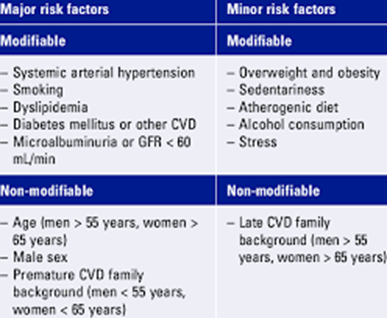A nurse in a provider's office is reviewing data from a client's medical record. Which of the following findings should the nurse identify as a risk factor for cardiovascular disease?
BMI of 24
Orthostatic hypotension
Type 1 diabetes mellitus
Family history of osteoporosis
The Correct Answer is C
A) BMI of 24 - A BMI of 24 falls within the normal range and is not considered a risk factor for cardiovascular disease.
B) Orthostatic hypotension - While orthostatic hypotension can be a sign of cardiovascular dysfunction, it is not a direct risk factor for cardiovascular disease.
C) Type 1 diabetes mellitus - Type 1 diabetes mellitus is a significant risk factor for cardiovascular disease due to its impact on blood sugar control and increased risk of atherosclerosis.
D) Family history of osteoporosis - While a family history of certain medical conditions can be indicative of genetic predispositions, osteoporosis is not directly linked to cardiovascular disease.

Nursing Test Bank
Naxlex Comprehensive Predictor Exams
Related Questions
Correct Answer is E,B,C,D,A
Explanation
First, the nurse should apply clean gloves (E) to maintain sterility and safety. Next, the nurse should disconnect the tube from the suction device (B), ensuring that the device is no longer actively working on the tube.
Before removing the tube, it is important to instill air into it (C); this helps clear any residual contents and minimizes the risk of aspiration. The nurse should then ask the client to take a deep breath (D), which helps close the epiglottis to prevent aspiration during the removal of the tube. Finally, the nurse can pinch and withdraw the tube (A), completing the process in a swift, steady motion to ensure comfort and safety for the client.
Correct Answer is B
Explanation
A. The nurse should stand on the client’s weaker side (left side) to provide support and stability during the transfer. Standing on the stronger side offers less assistance and increases the risk of falls.
B. When assisting a client with left-sided weakness to transfer from bed to chair, the nurse should use proper body mechanics to protect both the client and self.Flexing the hips and knees allows the nurse to use the leg muscles (strongest muscles) rather than the back, reducing risk of injury. This position also provides stability and balance, allowing controlled movement as the client stands.
C. Raise the bed to waist level before moving the client- Adjusting the bed height can facilitate the transfer process, but it is not directly related to the client's left-sided weakness.
D. Pivot on the foot farthest from the bed when assisting the client into the chair- Pivoting on the foot farthest from the bed allows for a smooth and controlled transfer motion but does not address the client's left-sided weakness specifically.
Whether you are a student looking to ace your exams or a practicing nurse seeking to enhance your expertise , our nursing education contents will empower you with the confidence and competence to make a difference in the lives of patients and become a respected leader in the healthcare field.
Visit Naxlex, invest in your future and unlock endless possibilities with our unparalleled nursing education contents today
Report Wrong Answer on the Current Question
Do you disagree with the answer? If yes, what is your expected answer? Explain.
Kindly be descriptive with the issue you are facing.
